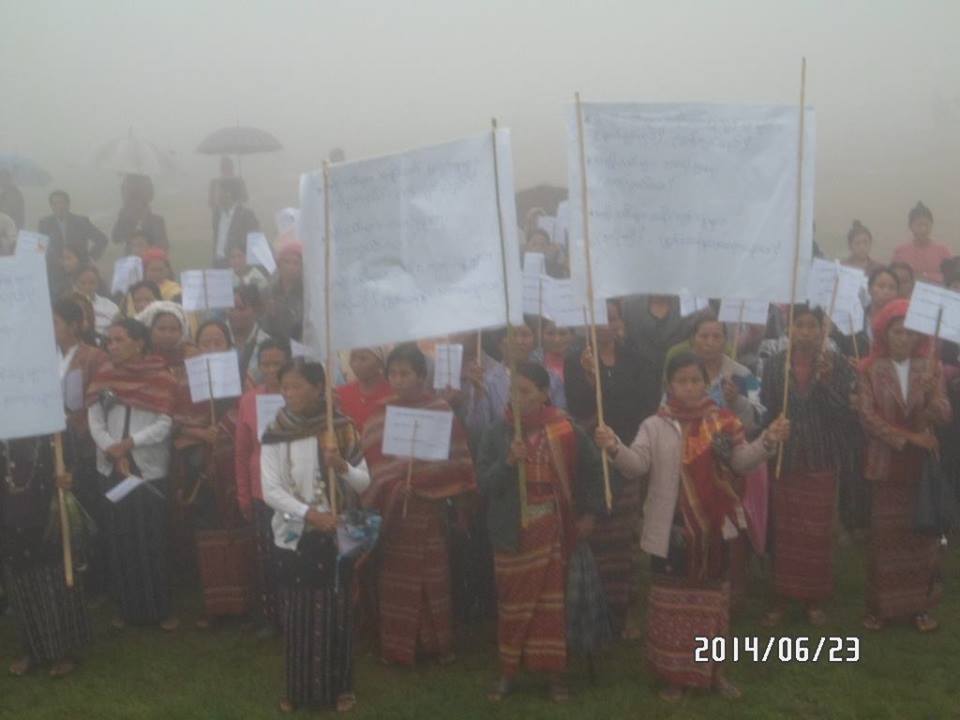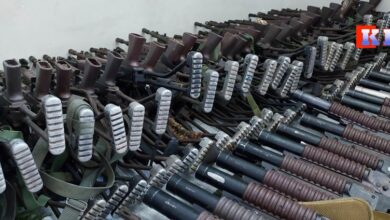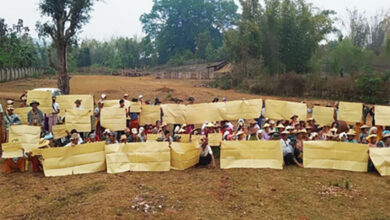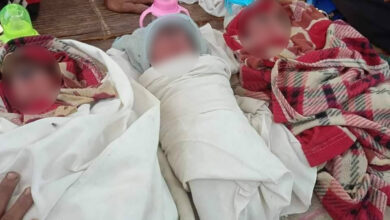State Authorities Harass Women’s Activists Following Anti-Rape Protests

Authorities in Chin State have arrested eight protesters following peaceful protests condemning the alleged attempted rape of a Chin woman by a Burma Army soldier on June 10.
The protests were in response to an alleged attempted rape of a 54-year-old woman by a soldier from Light Infantry Battalion 269 near the town of Razua, Chin State.
According to a statement by the Razua Women’s Group the woman was left seriously injured and was admitted to a hospital in Razua. The Razua Women’s Group said it organized the protest together with local villagers to demand justice in the case and asked permission from police, which was refused.
A second request to hold a protest in the nearby town of Matpui was also rejected, the Razua Women’s Group said.
The RWG stated that the local Burma Army commander offered US $100 and 15 packets of ‘Yum Yum’ noodles as ‘compensation’ for the attempted rape as well as threatening villagers.
“The officials told the community leaders not to hold a protest. They said that if they did, the newly implemented town development projects would be delayed by 5 to 10 years. They also said that if the police shot anyone during the protest, they would not take responsibility,” the RWG said.
Women’s leaders in Razua and Matpui decided to go ahead with the protests in spite of the threats, RWG said, with 600 locals demonstrating in Matpui and Razua in two separate protests held on June 23 and 24.
In response to the protests the the Razua Women’s Group said that authorities arrested eight civilians, including women’s leaders and youth representatives, involved in the protests – their cases are currently awaiting court hearings.
At least four of the activists were arrested under Burma’s controversial Peaceful Assembly and Peaceful Procession Act, which can lead to a one-year prison sentence.
Speaking to local media one of the youth leaders first arrested by authorities hit out at gender inequality in Burma.
“There is a tradition in Burma that women are not allowed to talk back to their husbands, and due to a lack of rule of law, they are reluctant to make an issue of the domestic violence they suffer, which encourages the perpetrators even more.”
The young woman, named Thang Zin said.
“We staged the protest to raise awareness, and encourage women not to be afraid to speak out.”
The Razua Women’s Group condemned the arrests.
“We… strongly urge the government authorities to immediately stop harassing our community leaders and drop all charges against them. We also repeat our calls for justice in the recent case of attempted rape, and for an end to military sexual violence against ethnic women.”
Speaking to Karen News of the alleged attempted rape, Rachel Fleming, advocacy director of the Chin Human Rights Organisation, said that women were at great risk of sexual violence in Chin State and that government forces were often the perpetrators.
“Sadly, this is not an isolated event. CHRO has documented five different sexual violence cases since President Thein Sein’s government took power in March 2011. One rape and murder was committed by a Meitei insurgent from Manipur in Northeast India, and the rest of the cases were committed by Burma Army soldiers.”
Ms Fleming said that CHRO had seen no change since the transition to a nominally civilian government in 2011. “These recent sexual violence cases follow the same pattern as those documented by CHRO at the height of military dictatorship: they are very violent, and committed with total impunity.”
Ms Fleming also noted that a May 2012 ceasefire agreement between the Chin National Front and the government had not stopped rape cases and that women were still targeted. “Three of the incidents have taken place since the ceasefire agreement was signed… The situation in Chin State is quite different to, for example, in Kachin State, where rape and sexual violence perpetrated by Burma Army soldiers against ethnic women is happening in the context of active conflict. And yet, ethnic Chin women and girls continue to be targeted for sexual violence by Burma Army soldiers. The common denominator is the presence of Burma Army soldiers.”
Chin State, bordering Bangladesh, India and Burma’s Rakhine State, Sagaing Division and Magway Division, is one of Burma’s poorest regions.
A January 2011 report by the New York based human rights group Physicians for Human Rights documented shocking rates of human rights abuse in Chin State, often perpetrated by government forces. Of the 621 households interviewed in the report, “91.9% reported at least one episode of a household member being forced to porter military supplies, sweep for landmines, be servants, build roads, and do other hard labor. The Burmese military imposed two-thirds of these forced labor demands; they also accounted for all reported rapes. Government soldiers tortured or beat ethnic Chins (reported by 14.8% of households), and killed and abducted civilians with impunity. One out of eight Chin households was forcibly displaced (most to find food), and one-third of all forcible conscriptions were of children under 15.”
According to reports in the Chinland Guardian, locals in the Razua area had witnessed other violent incidents recently, including the alleged shooting and killing of a Rezua man at the local police station by police and the attempted rape of a 14-year-old girl by a Burma Army soldier last year.
Ms Fleming warned that the true number of cases could be much higher.
“It’s important to bear in mind that there is still tremendous stigma surrounding rape, plus threats of reprisals if rape is reported. It is likely that other incidents have gone unreported,” she said.
“I don’t see how Chin women can ever truly feel safe from the threat of sexual violence until they know that there has been a permanent, publicly announced, independently verified withdrawal of Burma Army troops from their towns and villages as part of the peace process – especially as Burma Army soldiers continue to enjoy impunity for their crimes.”
A 2014 report by the Women’s League of Burma documented the rape of more than 100 women and girls, including 47 gang rapes, by the Burma Army since 2011. The report also said that 28 of the women and girls were either killed or later died of their injuries.




